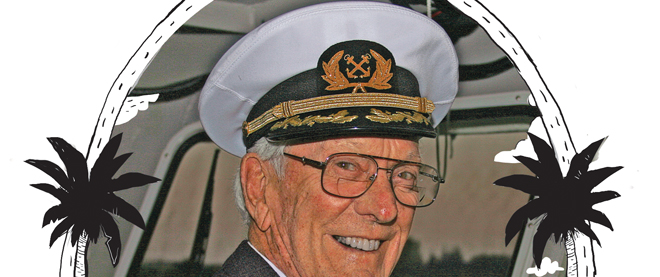Donald Rayworth Crandall
He nursed his wife through the tragedy of Alzheimer’s, but ‘he never complained that it was hard, and never asked for help’
Illustration by Juliana Neufeld
Share

Donald Rayworth Crandall was born on Oct. 19, 1926, in Moncton, N.B., to Milton and Mary Crandall, the youngest of three boys. The family loved to sail, and Milton, an automobile parts dealer, built several sailboats. When Donald was 14, a three-masted schooner came into Moncton with a load of lumber. “The captain had engine troubles and approached dad for help,” says Bud Crandall, Donald’s brother. “They became fast friends,” and Donald befriended the man’s young son. At the end of his stay, the captain suggested that Donald sail back to Turks and Caicos with them—and his parents agreed. The three months Donald worked as a deckhand in the Caribbean turned out to be one of his most memorable adventures.
Donald served in the navy during the Second World War, and then attended Mount Allison University in Sackville, N.B. In 1949, he took a job with Air Canada, working in market research and training. The position suited his outgoing personality and love of travel, since it sent him across Canada and to the Caribbean. In 1950, he married Frances, a kindred spirit: like Donald, she’d grown up in Moncton, served in the navy, and attended Mount Allison. After their children Louise and Hugh were born, the family settled in Montreal. Donald and Frances were “absolutely devoted” to each other, says daughter Louise.
When Frances was in her fifties, she started developing symptoms of Alzheimer’s. At 57, Donald retired from his job at Air Canada, “largely to look after her,” says Louise. They sold the house in Montreal and moved back to Moncton, but the couple didn’t like to talk about Frances’s health; Donald carried the burden of her care largely by himself. “He never complained that it was hard, and never asked for help,” Louise says.
After Donald’s retirement, the couple continued to travel. On one Caribbean trip, Donald and Frances—then in their sixties—discovered Montserrat, an island near Antigua with black sand beaches, and built a house there. Donald began devoting time to his growing interest in military history. He’d travel around the island, hunting for buried military cannons: Louise recalls accompanying him on one gruelling trek to the top of a mountain, where he’d heard cannons were buried. What Louise thought looked like “old logs” turned out to be military cannons from the 18th century. Donald rebuilt a powder house above the capital of Plymouth, and set up a military park with the cannons he’d dug up. He wrote a book on the island’s military history, working from home to be close to his wife, who was increasingly housebound. As Frances’s condition deteriorated, they moved permanently back to Canada, and she finally went into a Moncton nursing home. Bud calls this “probably the hardest thing that Donald ever did.” After diligently caring for his wife for almost two decades, Donald was able—at age 74—to relive his stint as a deckhand, and sailed through the Panama Canal to California on a 120-foot replica of an 1812 Baltimore clipper.
Following Frances’s death at age 76, friends introduced Donald to Eleanor Jonah, whose husband had died of a heart attack several years before. They became companions. Donald had a desire to move to Victoria, and persuaded Eleanor to go with him. “He rented a condo on the inner harbour,” she says, and they split the year between Victoria and Burlington, Ont., where they had previously settled.
In 2005, on Christmas Eve, Eleanor and Donald were “going to get our Christmas groceries,” she says, when another car crashed into them. Donald was hospitalized, and nearly died. While his body slowly recovered, his brain—which had been injured in the crash—never did. “When he came home, he couldn’t find his way around,” says Eleanor. His condition improved, then deteriorated. Donald began to show signs of dementia. “He never discussed it, and Eleanor had to help him,” says Louise. The couple moved to Burlington full-time. They’d go down to Lake Ontario, Eleanor recalls; “I’d take my library book and read, and he’d take his binoculars and count the sailboats. Coming home in the car, he’d pat me on my knee and say, ‘Oh, thank you for taking me there. Haven’t we had a lovely day?’ ”
In February 2010, Louise got a call from Eleanor. “At this point, his dementia was much worse,” says Louise. The family put Donald into a retirement home in Oshawa, Ont. Over the next 14 months, he gradually stopped eating. He died on April 20, due to complications from dementia. Donald was 84.